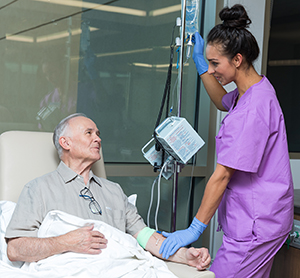Chemotherapy for a Brain Tumor
Chemotherapy (chemo) is a way of treating cancer with medicine. It may be given as a single medicine or a combination. There are many chemo medicines and combinations.
Chemo may be used alone or along with surgery or radiation therapy.
Here you can learn what chemo does, how it's given, and how to cope with common side effects.
 |
| Your IV treatment may last up to 8 hours, depending on the number of drugs given. |
How chemotherapy works
Both normal and cancer cells grow and divide. But cancer cells grow and divide out of control. And they can spread to other parts of the body. Chemotherapy kills fast-growing cells by disturbing their life cycle. But it does this to normal cells as well as cancer cells. Because of this, chemo can cause side effects. Fast-growing cells are most affected. In addition to cancer cells, this includes cells in the hair, digestive system, and blood.
How chemotherapy is given
Chemotherapy is given in cycles. You have periods of rest between the days that chemo is given. This allows your body to recover and build healthy cells between treatments. You can get chemo for a brain tumor in many ways, such as:
-
By injection into your blood through a vein by I.V. (intravenous) or through an artery by I.A. (intra-arterial).
-
Injected into the spinal canal and cerebrospinal fluid (intrathecal).
-
A pill, capsule, or liquid you take by mouth.
-
Chemo dissolvable wafers that are put in the brain at the parts of the tumor that can't be removed. (This is done during surgery.)
Coping with side effects
Chemotherapy can cause side effects in different parts of your body. Below are some tips to help control some of the more common short-term side effects.
For fatigue
-
Eat a healthy diet, and drink plenty of fluids.
-
Try not to do too much. Get help with chores.
-
Rest as needed. Do important things when you have the most energy.
-
Stay active. Regular exercise can ease fatigue. Ask your health care team what exercises are safe for you.
-
Some medicines can make you feel tired or make it hard to sleep. Talk with your care team about your medicines. A different dose or medicine may be an option.
For nausea or vomiting
-
Take anti-nausea medicine as soon as you feel queasy.
-
Eat small meals and snacks during the day.
-
Stay away from strong smells and foods that are fatty, spicy, fried, or very sweet.
-
Drink small amounts of liquids often to stay hydrated.
For diarrhea
-
Drink more liquids. Include sports drinks that help replace lost electrolytes.
-
Try eating small amounts of bland foods that are easy to digest. This may include mashed potatoes, rice, toast, bananas, applesauce, broth, ice pops, low-fat cottage cheese, and yogurt.
-
Avoid caffeine, greasy food, spices, beans, and raw fruits and vegetables.
-
Call your health care provider if the diarrhea doesn’t go away in 24 hours or if it's severe.
For low blood cell counts
A low white blood cell count makes your body less able to fight infection. If you have a low white blood cell count:
-
Wash your hands often.
-
Stay away from crowds and people who are sick.
-
Watch for signs of infection, like fever, swelling, redness, and cough. Contact your health care team right away if you have symptoms of an infection.
A low platelet count increases the risk of bleeding and bruising. If you have a low platelet count:
-
Limit activities that could cause cuts or bruising.
-
Brush your teeth with a very soft toothbrush, and ask your health care provider if it's okay to floss.
-
Blow your nose gently.
-
Don't take anti-inflammatory pain medicines (aspirin, ibuprofen, naproxen) unless your care team says you can.
A low red blood cell count (anemia) can make you very tired, pale, and short of breath. If you have anemia:
For hair loss
-
Ask your health care team if you are likely to lose some or all of your hair. Not all chemotherapy medicines cause hair loss.
-
Cut your hair short to make hair loss feel less extreme. Or you can choose to shave your head.
-
Be gentle when washing your hair.
-
Consider wearing a wig, hat, turban, or scarf.
For mouth sores
-
Brush your teeth after meals to keep your mouth clean and prevent infection. Use a soft toothbrush.
-
Rinse with salt and soda water. Dissolve 1/4 teaspoon of baking soda and 1/8 teaspoon of salt in 1 cup of warm water. Swish and spit as often as you like. Your health care team may also prescribe another type of mouth rinse.
-
Eat foods that are soft, bland, and easy to chew and swallow.
Possible long-term side effects
Possible long-term side effects depend on the chemo medicines used. They can include:
-
Infertility.
-
Organ damage (like your heart, lungs, kidneys, or bladder).
-
Hearing loss.
-
Vision changes.
-
Numbness and tingling in the hands and feet (peripheral neuropathy).
-
Changes in your hormone balance.
Talk with your health care team about the chemo medicines you take and the side effects you should watch for. Some of these may not cause problems until many years after treatment.
Working with your treatment team
Your cancer treatment team will talk with you about the possible side effects linked to your chemotherapy medicines. Tell them about any changes you notice. Most side effects can be treated, and some can even be prevented.
Ask your health care provider what signs to watch for and when to call. Know how to get help after office hours and on weekends and holidays.